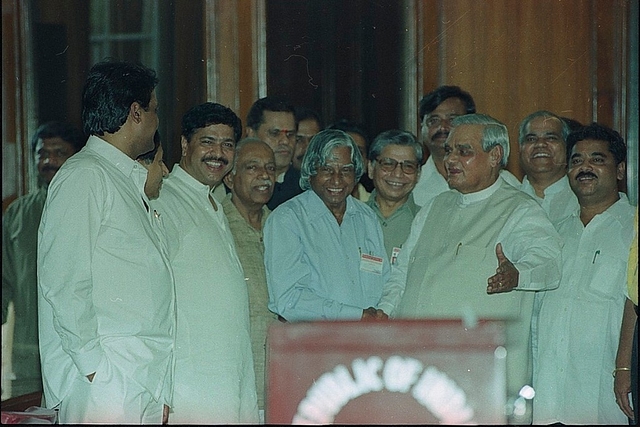
From Pokhran To Pokhran
For those interested in how, when and why India acquired nuclear weapons, this book is an essential read.
Indian Nuclear Policy. Harsh Pant and Yogesh Joshi. OUP India. Pages 208. Rs 260.
They are indeed murky waters in which the contours of Indian nuclear (weapons) policy lie, yet the field of research is fast becoming a tiny cottage industry of its own as more and more scholars are turning their attention to India's quest to militarise the atom. In a unique trajectory of development, India is perhaps the only country to develop nuclear weapons from what was initially an energy programme and also the only country to have a long and public debate over the matter; even more astonishingly, the military had little to no say in India's nuclear decision-making.
Harsh Pant and Yogesh Joshi have addressed this complex thread in the history of modern India in the pithily titled Indian Nuclear Policy, an impressively succinct introduction to the subject. The authors lay out the basic framework of the argument with the help of four causal variables – status, security, domestic politics, and the role of individuals – and proceed to expand on each into the book. This is a clever organisation that allows neophytes to quickly grasp the salient features of the narrative.
The four causal variables mentioned are not unique to India – they influence the actions of all powers, the varying degrees and different manners of which are hotly contested among scholars. Debates also focus on how some of these terms are to be interpreted – status, for example, may imply to realists something intangible and therefore an indication that the nuclear programme is not serious. These scholars do not deny that the conquest of the technical difficulties in assembling a nuclear device is difficult and therefore accrues status but this is seen as a byproduct rather than a motivator.
Indian Nuclear Policy emphasises a layer of nuance that is often overlooked or forgotten in discussions of security – although the motivation for the peaceful nuclear explosion at Pokhran in 1974 was most certainly China, the journey down the path to nuclearisation was in response to the threat from Pakistan. This periodisation provides a worthy explanation as to why the Indian nuclear establishment remained inert for 24 years after its first test rather than weaponise and perfect its nuclear arsenal, although economic factors certainly do contribute to the picture.
Domestic politics is a critical input in any policy formulation, particularly in democracies with a relatively free press. Indian Nuclear Policy highlights the pertinent trends in the Indian public sphere that influenced the thinking about nuclear policy such as India's principled stance against nuclear weapons, its idealist vision of international relations, and its vaunted non-alignment. In addition, bureaucratic differences of opinion between various ministries such as defence and finance, for example, added to the hubbub on domestic bickering.
It is presently not popular to credit individuals with much influence over the affairs of states but it is heartening to see that Pant and Joshi buck this trend. Despite the fairly public nature of Indian nuclear decision-making, actual power resided in the hands of very few individuals and everything, from information to construction, was tightly controlled. It is not implausible then, that the prime minister and the chairman of the Atomic Energy Commission commanded greater influence in the country's atomic quest.
For a short introduction, as Oxford University Press advertises the book, Pant and Joshi have produced an excellent manuscript that narrates the history of India's nuclear efforts from Independence until the five nuclear tests of 1998. The brevity of the final product should not deceive the reader into thinking that the argument has not been sufficiently researched – indeed, as the bibliography reveals, prodigious use of primary source material at the National Archives of India and the document collection at the Nehru Memorial Museum and Library have been made. The secondary material also spans the major works in the field.
In thinking beyond the scope of this particular text, a provocative thought experiment would be to challenge the hagiographic coverage India's leaders have usually received at the hands of academics. There is some merit to the argument that the moralist and "preachy" complexion of Indian foreign policy did little more than annoy the great powers with little for Delhi to show for it in return. In a costly error, India timed itself out of the Nuclear Non-Proliferation Treaty; nor could Delhi secure the desired security guarantees from the United States and the Soviet Union against nuclear blackmail. India's efforts at the United Nations were also for naught. India's weak economy and military simply did not give its idealism the political heft required to influence world affairs. In retrospect, a pertinent observation from Henry Kissinger comes to mind: moderation is a virtue only in those who are thought to have an alternative.
While one might not be able to guess from Indian Nuclear Policy, there is still plenty that is not known about decision-making in Delhi. The Indian government seems to have an aversion to transparency, easy access, documentation and declassification; it has been suggested by some retired bureaucrats that paranoia in the top echelons of the political class meant that notes were sometimes not kept on crucial meetings relating to Indian nuclear security. Pant and Joshi do a fabulous job of weaving together a coherent narrative from the material available but some of the several debates that remain unresolved could perhaps be quelled with further release of information.
Given Oxford's stated objective, Indian Nuclear Policy is an essential quick guide to the history of Indian nuclear weapons policy for rookies. By cutting through the details of India's energy programme and maintaining focus on the weapons themselves rather than strategy, Pant and Joshi do yeoman service to the public who are mildly curious about how, when and why India acquired nuclear weapons.